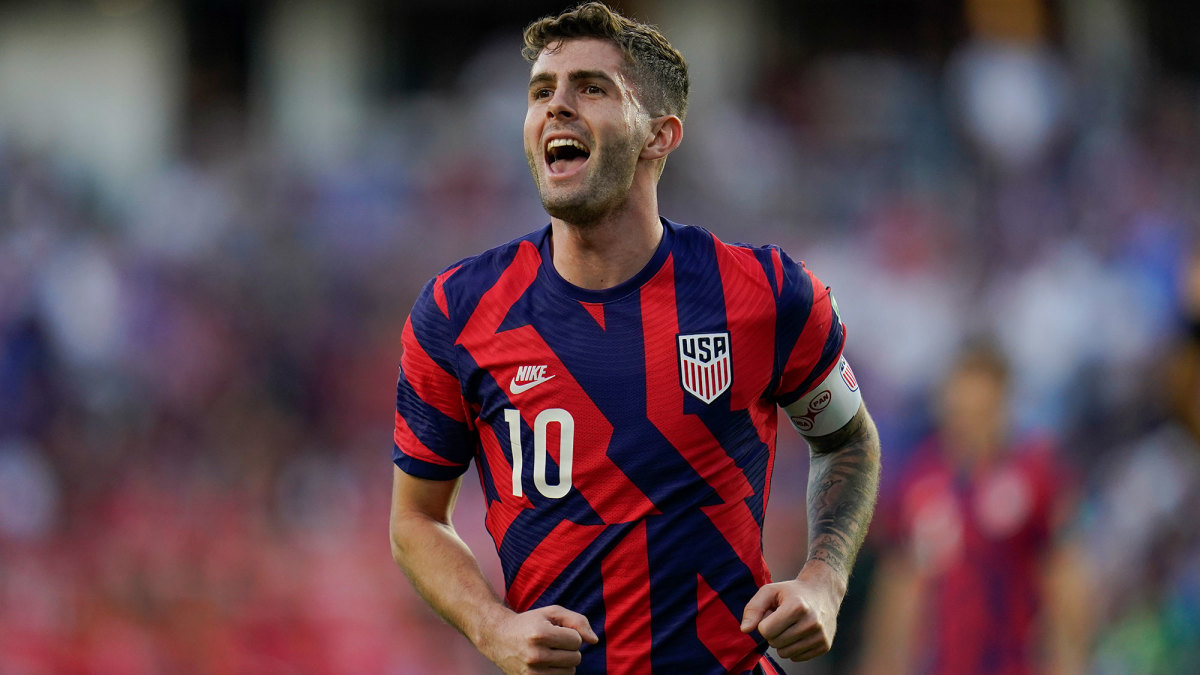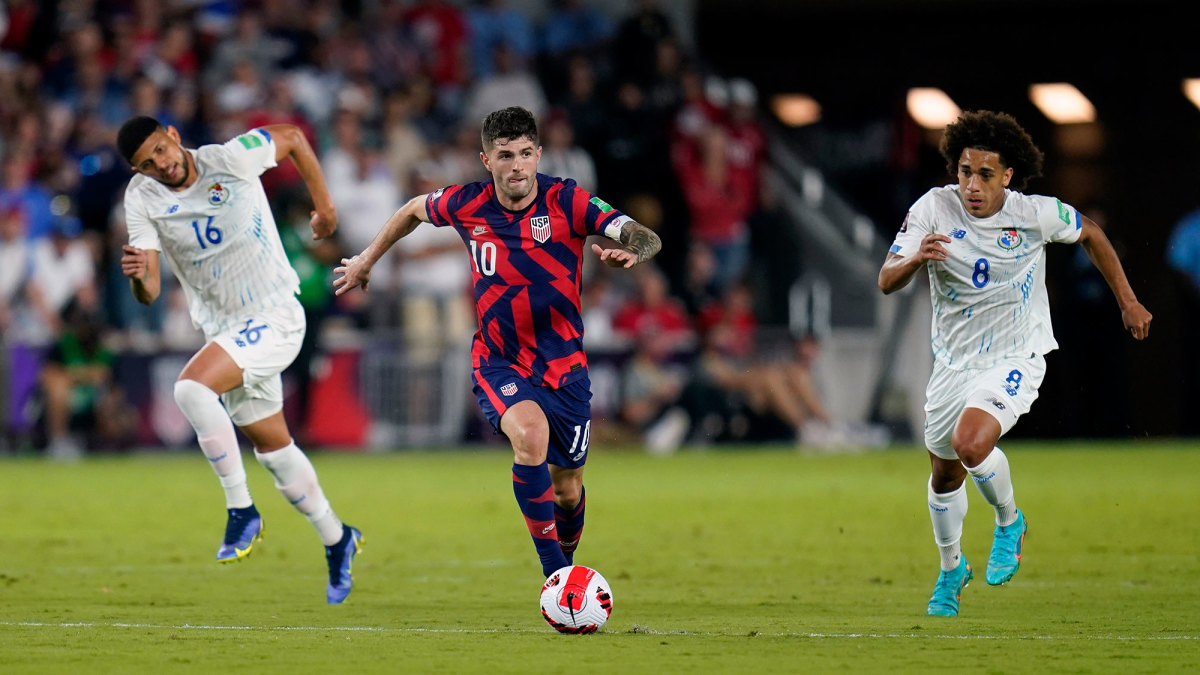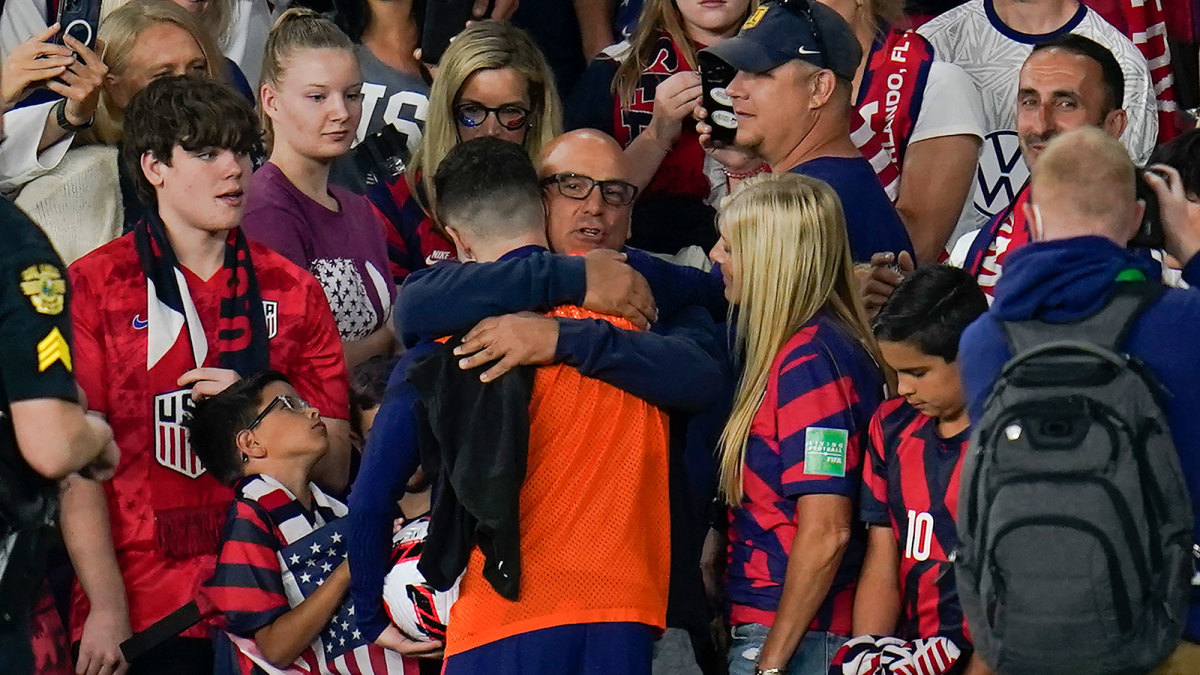Christian Pulisic Embraces His Status, Readiness to Become USMNT’s Leader
ORLANDO, Fla. — It’s become a relatively easy and clichéd crutch of a nickname. And it’s been popular for so long that one of the original Captain Americas, Claudio Reyna, has a son who’s a U.S. men’s national team regular. If you’re American and you do well at a foreign club, there’s a decent chance that fans, media or both are going to dub you ‘Captain America.’ It’s catchy, and it doesn’t require much creativity or effort.
Christian Pulisic may have bald eagle and flag tattoos on his left arm, and he’s certainly done well for foreign teams, winning major trophies at both Borussia Dortmund and Chelsea. But even though the London club leans into that lay-up of a nickname, Pulisic has said that he doesn’t really feel like a ‘Captain America.’
“I’m not a big fan of being called that, to be honest,” he told GQ early last year.
The fact that Pulisic was profiled in GQ tells you something, however. He’s not the most outgoing or vocal athlete, and he may not be the country’s most complete, robust or ever-present player. But he’s likely its most skillful and spectacular. And, as the first and most prominent member of this young American vanguard, Pulisic is the face of a glittering generation now on the verge of returning the U.S. to the World Cup.
The 23-year-old’s position as a leader and icon—someone who’s so often the focus of the public, the game plan and the opponent—has appeared to be a taxing burden at times. But during this climactic World Cup qualifying window, and especially on Sunday in Orlando, Pulisic embraced and fulfilled every level of his leadership potential. He was the catalyst, the inspiration and the primary architect behind the U.S.’s 5–1 demolition of Panama, which all but qualified the hosts for Qatar. Only an improbable six-goal loss in Wednesday’s finale at Costa Rica would relegate the U.S. (7-2-4) to a one-game intercontinental playoff.

Pulisic, who notched his first U.S. hat trick, left the Exploria Stadium field to a sold-out. standing ovation when Sunday’s work was done. While the armband was passed to defender Walker Zimmerman for the remainder of the match, Pulisic was every bit America’s captain.
“I think the important thing was he did his role, and his role involves making special plays and scoring some goals,” U.S. coach Gregg Berhalter said following the win. “But there’s a whole other bunch of things that come with it, and that’s what you saw tonight. His work rate, his defensive work rate, his duels, his second balls, his challenges, his passing, dribbling. You name it, he did it tonight.”
To appreciate the excellence and significance of Pulisic’s performance, one has to consider Sunday’s stakes as well as his path over the past few months. It was only January when Pulisic seemed beleaguered and overwhelmed. He was left on the bench during several Chelsea games and arrived in U.S. camp ahead of qualifiers against El Salvador, Canada and Honduras in a somewhat reserved and introspective mood.
“It’s a lot sometimes. It’s always when I come to the national team, it’s, ‘How are things at Chelsea? What’s this? What’s that?’ And yeah, things are, it’s tough. It’s tough. It’s definitely played a lot on me. And mentally, it’s been difficult at times,” he said then.
Pulisic didn’t have much of an impact as a starter in the win over the Salvadorans or the defeat in Canada, then was relegated to reserve duty for the frigid tilt with Honduras in Minnesota. With a bit of pressure lifted from his shoulders and the Americans holding a two-goal lead, Pulisic entered and scored in the second half.
“I felt it was a decision that was made to put him in the best possible position to make the impact that we know he can make,” Berhalter said of the choice to bring Pulisic off the bench in St. Paul.
“It’s never easy when you’re a high-profile player and you’re not in the form of your life, and those things are very hard to always capture—especially when you’re at a club like Chelsea,” the manager continued. “But he’s a guy that means a heck of a lot to this team. He’s one of the top performers in the team over this stretch of time, and he’s going to be a huge contributor to what we do moving forward.”

Consistently maintaining that “form of your life” at the game’s highest level is a bit like trying to jump and then stay in the air. Very, very few players on that exclusive stage manage it. The law of averages, the laws of physics, the ferocity and quality of competition—all conspire to force a slight regression to the mean. And at that level, slight is noticeable.
After a DNP in the Club World Cup semifinal in early February, Pulisic played nearly 90 minutes of the extra-time triumph over Palmeiras in the decider. While in Abu Dhabi, he offered some insight into the demands he puts on himself, as well as the occasional complications resulting from his national team profile.
“I still haven’t completely learned. Especially going back to the U.S., sometimes I put too much pressure on myself that I need to do something special,” he told ESPN. “For example, in the last national team games, the first couple I’m going into it thinking, ‘I need to over-perform and do something to save the team.’ But there’s no need for that because we have a very strong team. I think at times I was overthinking it and trying to be too good in a way that’s not necessary. I don’t need to, whatever, overcomplicate things.”
With the Club World Cup in tow, a resurgent few weeks at Chelsea boosted Pulisic’s confidence and helped free his mind. He scored three goals, including two against Lille in the Champions League round of 16. As the U.S. was hit with injures to the likes of Weston McKennie, Sergiño Dest and Brenden Aaronson, Pulisic was rounding into form.
“It’s been a pleasure to watch. … It’s a rollercoaster, especially when you’re at a club like Chelsea. When you’re at these massive clubs, it’s very, very difficult,” Berhalter said as camp opened this month.
“All they ask him to do is just to keep fighting, keep working and wait for his opportunity and he’s done that and he’s taken advantage of it,” he continued. “So for us, we expect very similar things. He needs to keep arriving in the box because we know, when he gets in good positions, he scores. And just continue to focus on the basics and he’ll be the leader that we expect him to be.”
Narrow your focus. Trust in your ability. Don’t lead by trying consciously to lead. Lead by doing what you instinctively do best. Pulisic’s emotional investment in the national team is obvious, whether it was his tears four years ago in Couva or the way he pounded the turf ferociously after missing a clear chance in last week’s draw at Mexico. That vigor just needed to be channeled. Berhalter trusted Pulisic to figure it out and named him captain in Orlando (Tyler Adams wears the armband more frequently).
“I think he was really focused on this game. In the days leading up to this game you could just tell he was in his zone,” U.S. goalkeeper Zack Steffen told Fox.
Pulisic’s zone spanned the entirety of the Exploria field. He was alert, confident, plugged in with his teammates and all over the ball. He was fouled hard and kept his composure. He played with his head up and was eager to challenge defenders. After burying a 17th-minute penalty kick, Pulisic helped set up the second by playing a pass to Antonee Robinson seconds before being cleaned out by Panama’s Michael Murillo. Robinson fed Paul Arriola for a gorgeous header and a 2–0 lead.
Pulisic added a second goal with another first-half penalty, then added to his legend with a sublime second-half exclamation point. On a play that looked like an homage to Dennis Bergkamp or Thierry Henry, Pulisic settled a cross between his own legs with his back to goal, touched the ball through the legs of a defender then finished cleanly from eight yards. He commemorated the hat trick with a dash toward the U.S. reserves warming up near the corner flag.
Christian Pulisic’s goal to complete his hat trick last night was *special* 💫
— SI Soccer (@si_soccer) March 28, 2022
(via @USMNT) pic.twitter.com/YSuddQapAa
That one was for the team. Pulisic’s celebration following his second goal was more personal. He tried the ‘worm’ as a tribute to a teenage cancer patient who spent time with the U.S. in Florida and asked to see the dance. That’s also captain behavior. Arriola gave Pulisic’s worm a 5 rating (it was lacking in flexibility, apparently). But the rest of Pulisic’s performance surely was worth double. He remained vital even following the final whistle, when he was among the first to realize that a banner reading ‘QUALIFIED’ had been handed to U.S. players. Pulisic raced in to yank it away.
“There’s something special about Christian, and him as our captain tonight, to be able to step up a couple times to finish PKs, and then his great run and finish that he had for his third goal was great,” Arriola said. “I mean he’s a great kid, great leader, obviously unbelievable, even better person. So I’m super happy for him.”
Pulisic spent time with his parents following the victory, like he did when he won the Champions League with Chelsea last spring. The prestige that comes with lifting that trophy is undeniable. But for Pulisic, there clearly is something special about playing for the U.S. Wearing that jersey taps into an intensity, a vulnerability and the sort of ample possibility that simply captures the imagination.

“It’s obviously different in ways, where playing for your country is a massive honor. But similar feelings—I mean, the reason that tonight meant so much is because we want to be on the biggest stage and playing in the World Cup, and that’s the biggest thing you can do at the international level,” Pulisic said Sunday night. “So that’s exactly where we want to be. That’s why the emotions were high tonight and yeah, we put on a really good performance and [we’re] hoping that we can be there.”
The accolades are accumulating: Club World Cup and Champions League winner. DFB-Pokal and Concacaf Nations League winner. Three-time U.S. Soccer men’s player of the year. Only one man, Landon Donovan, has won four. Donovan, of course, has something else Pulisic lacks—World Cup experience and a transcendent World Cup moment. As doubts about his durability fade, as he matures, and as his belief and big-game contributions pile up, Pulisic seems destined for the first and eminently capable of the second. The U.S. is 90 minutes away.
“I’ve been around this team for a little while and obviously with what happened around last cycle, I’m just really proud to be part of this team and I’m really happy with what the guys have shown,” Pulisic said in Orlando. “So I’m happy to be able to lead in any way that I can and help these guys, and they do the same for me.”
More Soccer Coverage:
